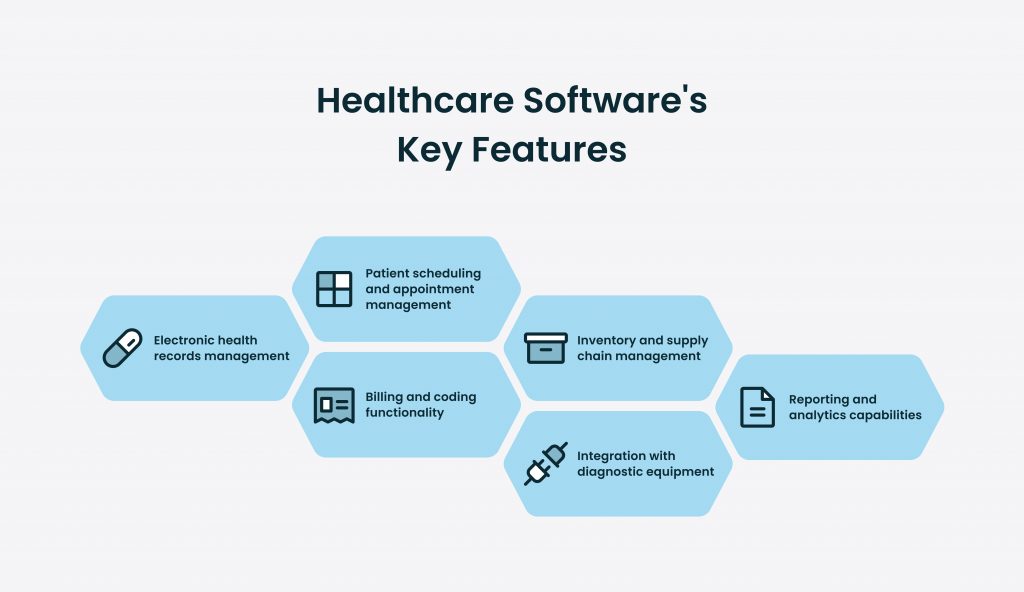Healthcare management software is an essential tool for modern healthcare organizations, enabling them to streamline processes, improve patient care, and enhance operational efficiency. However, one question that often arises when considering the implementation of such software is, “How much does it cost to develop a healthcare management software?” In this article, we will explore the main factors that influence the cost of healthcare management software development and provide insights into how organizations can reduce these costs.
Understanding the Basics of Healthcare Management Software
Before delving into the cost aspects, let’s first understand the basics of healthcare management software. This type of software is designed to automate and digitize various processes within a healthcare organization, including patient registration, scheduling appointments, managing electronic health records, billing and coding, inventory management, and more. By consolidating and centralizing these processes, healthcare management software enables healthcare providers to improve overall efficiency, reduce errors, and enhance patient outcomes.
Healthcare management software has become an integral part of modern healthcare systems. It not only streamlines administrative tasks but also facilitates better communication and collaboration among healthcare professionals. With the ability to access patient information in real-time, healthcare providers can make more informed decisions and provide personalized care.
Key Features of Healthcare Management Software

When developing healthcare management software, it is crucial to incorporate key features that cater to the specific needs of healthcare organizations. These features typically include:
- Electronic health records (EHR) management: This feature allows healthcare providers to securely store and access patient health records electronically. It eliminates the need for paper-based records, making information retrieval faster and more efficient.
- Patient scheduling and appointment management: Healthcare management software offers robust scheduling capabilities, allowing patients to easily book appointments and healthcare providers to manage their schedules effectively. It also sends automated reminders to patients, reducing no-show rates.
- Billing and coding functionality: With integrated billing and coding features, healthcare organizations can streamline their revenue cycle management. The software automates the billing process, ensuring accurate coding and timely submission of claims.
- Inventory and supply chain management: This feature enables healthcare organizations to track and manage their inventory of medical supplies and equipment. It ensures that essential items are always available, minimizing disruptions in patient care.
- Integration with diagnostic equipment: Healthcare management software can integrate with various diagnostic equipment, such as laboratory analyzers and imaging devices. This integration enables seamless data transfer and improves the efficiency of diagnostic procedures.
- Reporting and analytics capabilities: Healthcare management software provides robust reporting and analytics tools, allowing healthcare organizations to gain insights into their operations. It generates comprehensive reports on key performance indicators, helping identify areas for improvement.
These features serve as the foundation of healthcare management software and are essential for ensuring the smooth operation of healthcare organizations.
Importance of Healthcare Management Software
We at Wesoftyou understand the importance of healthcare management software in the current healthcare landscape. From our experience, we have witnessed how the implementation of such software can revolutionize the way healthcare organizations operate. By automating manual processes and centralizing data, healthcare management software reduces administrative burden, enhances data accuracy, and improves overall patient care.
Healthcare management software not only benefits healthcare providers but also has a positive impact on patients. With streamlined processes and improved efficiency, patients experience shorter wait times, better coordination of care, and increased access to their health information. Additionally, the software’s reporting and analytics capabilities enable healthcare organizations to identify trends and patterns, leading to better decision-making and improved patient outcomes.
In conclusion, healthcare management software plays a vital role in modern healthcare systems. Its ability to automate processes, improve efficiency, and enhance patient care makes it an indispensable tool for healthcare organizations. As technology continues to advance, we can expect healthcare management software to evolve and adapt to meet the ever-changing needs of the healthcare industry.
Factors Influencing the Cost of Healthcare Management Software
While healthcare management software offers numerous benefits, it is essential to consider the factors that influence its development cost. Understanding these factors can help organizations make informed decisions and optimize their software development budget.
Healthcare management software plays a crucial role in streamlining operations, improving patient care, and enhancing overall efficiency within healthcare organizations. However, the cost of developing such software can vary significantly based on several key factors.
Complexity of the Software
The complexity of the software is a crucial determinant of its development cost. Healthcare management software that includes intricate functionality, integrates with multiple systems, and requires advanced security measures will inevitably require more development effort. As a result, the complexity of the software directly impacts the overall cost.
Developing a robust healthcare management software solution involves various intricate components, such as appointment scheduling, patient records management, billing and invoicing, inventory management, and reporting. Each of these elements requires careful planning, coding, and testing to ensure seamless functionality.
Furthermore, the integration of advanced features like telemedicine capabilities, artificial intelligence algorithms, or predictive analytics can significantly increase the complexity of the software, leading to higher development costs.
Customization Requirements
Each healthcare organization has unique requirements, workflows, and processes. Therefore, healthcare management software often needs to be customized to meet these specific needs. Customization can include tailoring the user interface, integrating with existing systems, and incorporating organization-specific workflows. The level of customization required will influence the development cost.
Customization ensures that the software aligns perfectly with the organization’s existing infrastructure and workflows, allowing for seamless integration and improved efficiency. However, the more extensive the customization requirements, the more time and effort it will take to develop the software, resulting in increased costs.
Additionally, organizations may require specific features or modules that are not readily available in off-the-shelf healthcare management software solutions. In such cases, custom development is necessary, further impacting the overall cost.
Integration with Existing Systems
Integrating healthcare management software with existing systems, such as electronic medical record (EMR) systems, laboratory information systems (LIS), or picture archiving and communication systems (PACS), can significantly impact the development cost. Seamless integration ensures smooth data flow between systems, enabling healthcare organizations to benefit from a comprehensive and unified platform.
Integration with existing systems is crucial for healthcare management software to provide a holistic view of patient data, streamline workflows, and eliminate duplicate data entry. However, integrating with different systems can be complex and time-consuming, requiring extensive coding, testing, and validation.
Furthermore, the level of integration required can vary depending on the organization’s existing infrastructure and the number of systems that need to be connected. The more extensive the integration, the higher the development cost.
It is also important to consider the compatibility of the healthcare management software with different systems and technologies. Compatibility issues can arise when integrating with legacy systems or systems from different vendors, requiring additional development efforts and potentially increasing costs.
In conclusion, the cost of developing healthcare management software is influenced by various factors, including the complexity of the software, customization requirements, and integration with existing systems. Organizations must carefully evaluate these factors to make informed decisions and ensure that their software development budget is optimized.
Breakdown of Healthcare Management Software Development Costs
So, what are the specific costs associated with healthcare management software development? Let’s break them down:
Design and User Interface Costs
The design and user interface are crucial aspects of healthcare management software. A well-designed, user-friendly interface enhances the user experience and increases software adoption rates. Investing in quality design and user interface development is therefore essential to deliver a reliable and intuitive software solution.
When it comes to the design of healthcare management software, there are several factors to consider. The software should have a clean and modern look, with intuitive navigation and clear labeling. The color scheme should be chosen carefully to ensure readability and accessibility for users with visual impairments. Additionally, the software should be responsive and compatible with different devices, such as desktops, laptops, tablets, and smartphones.
Creating a user interface that meets these requirements involves a collaborative effort between designers, developers, and healthcare professionals. Designers need to understand the specific needs and workflows of healthcare providers to create an interface that is both aesthetically pleasing and functional. This process may involve multiple iterations and feedback from users to ensure that the final design meets their expectations.
Backend Development Costs
The backend development includes the development of databases, data storage, server configuration, and API development. These backend components are critical for the smooth operation of healthcare management software. A robust and scalable backend infrastructure ensures high performance, data security, and the ability to handle significant data volumes.
Developing the backend of healthcare management software involves various tasks and considerations. First, developers need to design and implement a database schema that can efficiently store and retrieve data. This may involve creating tables, defining relationships between entities, and optimizing queries for fast retrieval.
Next, developers need to configure servers and set up the necessary infrastructure to host the software. This may involve choosing a cloud provider, provisioning virtual machines, and configuring load balancers and firewalls for security and scalability.
In addition to these tasks, developers also need to develop APIs (Application Programming Interfaces) that allow different components of the software to communicate with each other. APIs enable integration with other systems, such as electronic health record systems or billing systems, and facilitate data exchange between different healthcare providers.
Testing and Quality Assurance Costs
Thorough testing and quality assurance are essential to ensure the reliability and performance of healthcare management software. Testing should encompass functional testing, performance testing, security testing, and user acceptance testing. Allocating sufficient resources for testing and quality assurance is crucial to prevent potential issues and ensure a smooth implementation.
Functional testing involves verifying that the software meets the specified requirements and functions as intended. This includes testing different features and workflows to ensure they work correctly and produce the expected results. Performance testing, on the other hand, focuses on evaluating the software’s performance under different load conditions to identify any bottlenecks or performance issues.
Security testing is also crucial for healthcare management software, as it deals with sensitive patient data. This involves conducting vulnerability assessments, penetration testing, and ensuring compliance with relevant security standards and regulations, such as HIPAA (Health Insurance Portability and Accountability Act).
User acceptance testing is the final stage of testing, where end-users evaluate the software and provide feedback. This helps identify any usability issues or areas for improvement before the software is deployed in a production environment.
Investing in comprehensive testing and quality assurance is essential to deliver a reliable and high-quality healthcare management software solution. It helps minimize the risk of software failures, data breaches, and user dissatisfaction, ultimately leading to improved patient care and operational efficiency.
Ongoing Costs for Healthcare Management Software
The cost of healthcare management software development does not end with the initial implementation. Organizations must also consider ongoing costs associated with maintenance, updates, training, support, and licensing.
When it comes to healthcare management software, maintenance and updates are crucial to keep the system running smoothly. Regular maintenance ensures that the software remains up to date and secure. This includes bug fixes, security patches, performance optimizations, and system upgrades. Allocating resources for ongoing maintenance and updates is essential to avoid operational disruptions and maintain software reliability.
In addition to maintenance, healthcare organizations must also invest in training and support for their staff. Proper training is essential for successful software adoption and utilization in a healthcare setting. It ensures that employees are equipped with the necessary skills to effectively use the software and make the most of its capabilities. Investing in training not only improves efficiency but also enhances patient care.
Having reliable technical support is equally important. Healthcare organizations need a dedicated support team that can promptly address any software-related issues. This minimizes downtime and ensures that the system runs smoothly at all times. Technical support also provides assistance in troubleshooting, resolving problems, and offering guidance to users.
Furthermore, healthcare organizations must comply with various regulations and industry standards, such as HIPAA and GDPR. These regulations are in place to protect patient privacy and ensure the security of sensitive data. Obtaining the necessary licenses and ensuring compliance with these regulations adds additional costs. However, investing in licensing and compliance is essential for maintaining the trust of patients and safeguarding their confidential information.
In conclusion, the ongoing costs associated with healthcare management software go beyond the initial implementation. Maintenance, updates, training, support, and licensing are all important factors to consider. By investing in these areas, healthcare organizations can ensure the smooth operation of their software, maximize its potential, and comply with industry regulations.
Ways to Reduce the Cost of Healthcare Management Software Development
While the cost of healthcare management software development can be significant, there are several strategies that healthcare organizations can employ to reduce these costs:
Choosing the Right Development Partner
Partnering with an experienced software development company, like WeSoftYou, can significantly impact the success and cost-effectiveness of healthcare management software development. A competent development partner understands the specific requirements of healthcare organizations and can provide tailored solutions that align with budgetary constraints.
For example, WeSoftYou has a team of dedicated professionals with extensive experience in healthcare software development. They have a deep understanding of the industry’s regulatory requirements and can ensure that the software solution complies with all necessary standards. By leveraging their expertise, healthcare organizations can save time and resources that would otherwise be spent on rectifying compliance issues.
In addition, a reliable development partner like WeSoftYou can offer cost-effective development models, such as offshore development, which can significantly reduce labor costs without compromising the quality of the software. This allows healthcare organizations to allocate their budget more efficiently and invest in other critical areas.
Prioritizing Essential Features
When developing healthcare management software, it is important to prioritize essential features that align with the organization’s goals and objectives. By focusing on core functionalities and avoiding unnecessary bells and whistles, organizations can optimize development costs while still delivering a robust and effective software solution.
For instance, instead of investing resources in developing complex features that may not be crucial for the organization’s immediate needs, healthcare organizations can prioritize features that directly address their most pressing challenges. This approach ensures that the software meets the organization’s core requirements while minimizing unnecessary development costs.
Furthermore, by involving key stakeholders, such as healthcare providers and administrators, in the feature prioritization process, organizations can gain valuable insights into the functionalities that would bring the most value to their operations. This collaborative approach not only helps reduce development costs but also enhances user satisfaction and adoption rates.
Opting for a Phased Development Approach
Rather than attempting to develop the entire healthcare management software solution at once, organizations can benefit from a phased development approach. This allows for incremental development, testing, and implementation, resulting in reduced upfront costs and the ability to address emerging needs and feedback iteratively.
By breaking down the development process into manageable phases, healthcare organizations can allocate their resources more effectively and avoid the financial burden of developing a comprehensive software solution all at once. Each phase can focus on specific modules or functionalities, allowing for thorough testing and refinement before moving on to the next phase.
Moreover, a phased development approach enables organizations to adapt to changing requirements and incorporate user feedback throughout the development lifecycle. This iterative process ensures that the final software solution meets the evolving needs of the organization, reducing the risk of costly rework or dissatisfaction with the end product.
Additionally, a phased development approach provides an opportunity for healthcare organizations to secure funding for each phase separately, spreading out the financial investment over time. This can be particularly beneficial for organizations with limited budgets or those seeking external funding.
FAQ
The development timeline for healthcare management software can vary depending on the complexity of the project, customization requirements, and integration needs. It is best to consult with a software development company to receive an accurate estimation based on your specific project.
Developing healthcare management software is a complex process that requires careful planning, design, development, and testing. The timeline for development can range from a few months to over a year, depending on the scope of the project. Factors that can affect the timeline include the number of features and functionalities required, the integration with existing systems, and the level of customization needed to meet the unique needs of the healthcare organization.
During the development process, software engineers and developers work closely with healthcare professionals to understand their requirements and design a solution that meets their needs. This involves conducting thorough research, analyzing existing workflows and processes, and identifying areas where automation and digitalization can improve efficiency and patient care.
Once the initial design and planning phase is complete, developers begin coding the software, creating the necessary algorithms, databases, and user interfaces. This is a time-consuming process that requires attention to detail and a deep understanding of healthcare regulations and best practices.
After the coding phase is complete, the software goes through rigorous testing to ensure that it functions as intended and meets the highest standards of quality and security. This includes testing for bugs, vulnerabilities, and compatibility with different operating systems and devices.
Once the software has been thoroughly tested and any issues have been resolved, it is ready for deployment. This involves installing the software on the organization’s servers or cloud infrastructure and configuring it to work seamlessly with existing systems and workflows.
Overall, the development of healthcare management software is a complex and time-consuming process that requires expertise in both software development and healthcare. By working with a reputable software development company, you can ensure that your project is completed efficiently and effectively, resulting in a high-quality software solution that meets your organization’s needs.
Ensuring the security of healthcare management software involves implementing industry-standard security measures, such as data encryption, user authentication, and intrusion detection systems. Working with an experienced software development company, like WeSoftYou, can ensure that appropriate security measures are in place.
In today’s digital age, the security of healthcare management software is of utmost importance. Healthcare organizations handle sensitive patient data, including personal information, medical records, and financial details. Therefore, it is crucial to implement robust security measures to protect this data from unauthorized access, breaches, and cyber-attacks.
One of the key security measures for healthcare management software is data encryption. This involves converting sensitive data into an unreadable format, which can only be decrypted with the use of a unique encryption key. By encrypting data at rest and in transit, organizations can ensure that even if the data is compromised, it remains unreadable and unusable to unauthorized individuals.
User authentication is another important security measure. This involves implementing strong password policies, multi-factor authentication, and role-based access control to ensure that only authorized individuals can access the software and its data. By implementing these measures, organizations can prevent unauthorized access and reduce the risk of data breaches.
Intrusion detection systems are also crucial for healthcare management software. These systems monitor network traffic and detect any suspicious or malicious activities. By continuously monitoring the software and its environment, organizations can identify and respond to potential security threats in a timely manner, minimizing the impact of any security incidents.
Working with an experienced software development company, like WeSoftYou, can ensure that appropriate security measures are in place throughout the development process. Such companies have expertise in developing secure software solutions and can implement industry best practices to protect your healthcare management software from security threats.
Contact WeSoftYou today for a free consultation and project estimation. Our team of experts is ready to assist you in developing a cost-effective healthcare management software solution tailored to your organization’s needs.
At WeSoftYou, we understand the unique challenges faced by healthcare organizations in managing their operations and providing quality patient care. Our team of experienced software developers, engineers, and healthcare professionals work together to design and develop customized software solutions that meet the specific needs of our clients.
When you choose to work with WeSoftYou, you can expect a collaborative and transparent development process. We start by conducting a thorough analysis of your organization’s requirements, workflows, and goals. This allows us to gain a deep understanding of your needs and design a software solution that addresses them effectively.
Our team follows industry best practices and uses the latest technologies to develop secure, scalable, and user-friendly healthcare management software. We prioritize data security and implement robust security measures to protect your sensitive information from unauthorized access and breaches.
In addition to development, we also provide comprehensive support and maintenance services to ensure that your healthcare management software continues to perform optimally. Our team is available to address any issues or concerns you may have and provide timely updates and enhancements as needed.
When you partner with WeSoftYou, you can rest assured that you are working with a trusted and reliable software development company that is committed to delivering high-quality solutions that meet your organization’s unique needs. Contact us today for a free consultation and project estimation.





















